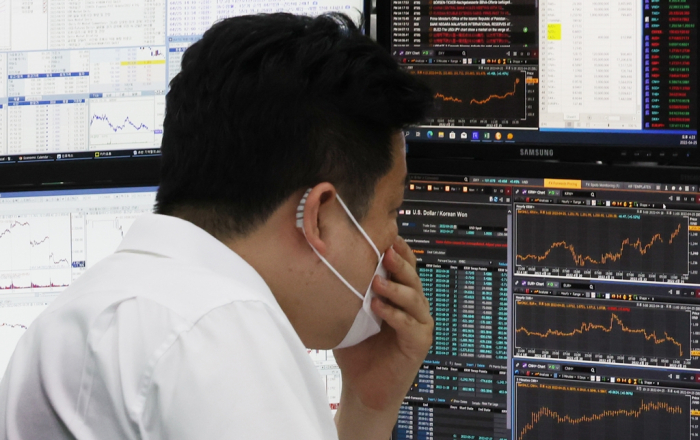Foreign exchange
Korean won at 2-year low, adding to inflationary pressure
Finance Minister Hong Nam-ki again warns of stabilization measures, but the won is expected to weaken further
By Apr 28, 2022 (Gmt+09:00)
2
Min read
Most Read
LG Chem to sell water filter business to Glenwood PE for $692 million


Kyobo Life poised to buy Japan’s SBI Group-owned savings bank


KT&G eyes overseas M&A after rejecting activist fund's offer


StockX in merger talks with Naver’s online reseller Kream


Mirae Asset to be named Korea Post’s core real estate fund operator



South Korea’s won currency skidded to the lowest level in more than two years on Thursday, adding to fears over growing inflationary pressure in Asia’s fourth-largest economy.
Finance Minister Hong Nam-ki issued another warning against its recent weakness, but that was not enough to support the local currency, prompting expectations of its further decline.
The won dropped 0.6% to close the domestic foreign exchange market at 1,272.5 against the dollar, the weakest local finish since March 19, 2020, extending its sliding spree to a sixth consecutive session. The South Korean unit has lost 2.9% during the period.
As the local currency continued to decline, Hong said earlier in the day the foreign exchange authorities would take stabilization measures, if necessary.
“The government is closely monitoring the situation and will make efforts to stabilize the market if needed,” Hong told a scheduled meeting of senior economic officials.
Hong made a similar warning earlier this month when the won weakened past 1,230 to the greenback, telling foreign correspondents that the authorities are ready to stabilize the currency market and they will take the steps if needed.
Earlier this week, the Ministry of Economy and Finance also warned of such measures. But none of them succeeded in helping the won rebound.
BOJ, YEN
The South Korean currency on Thursday extended its decline after media reported the Bank of Japan doubled down on its ultra-eased policy and pledged to buy unlimited amounts of 10-year government bonds while keeping interest rate targets unchanged.
After the decision, the Japanese yen tumbled to a 20-year low of 130.28 against the US currency, pushing up the dollar index, a measure of its value against a basket of major currencies such as the euro, the yen and the British pound, to 103.27, its strongest in five years, according to Reuters.
The won has already been under pressure from expectations of the US Federal Reserve’s aggressive monetary policy tightening and concerns over a slowdown in China’s economy due to lockdowns against the COVID-19, South Korea’s top export market.
South Korea’s foreign exchange authorities grew more concerned over the won’s weakness since it was expected to increase inflationary pressure, rather than improve the price competitiveness of domestic exporters.
Consumer inflation last month jumped 4.1% on-year, the largest growth since December 2011 given skyrocketing energy and commodity prices.
The authorities, however, do not plan to carry out a large-scale intervention in the market but to warn against excessive weakness or conduct smoothing operations, according to sources.
“Major currencies except for the dollar also weakened,” said a finance ministry official. “We will prepare measures in comprehensive consideration of inflation and an economic recovery.”
Bank of Korea Governor Rhee Chang-yong also said on April 25 that the won’s depreciation was not as severe as other currencies, given the dollar’s recent strength.
Such remarks added to expectations of the won’s further slides with a forecast of weakening to 1,280 versus the greenback in the near term.
Write to Jung-hwan Hwang at jung@hankyung.com
Jongwoo Cheon edited this article.
More to Read
-
 EconomySurging dividend outflows to hit Korea's current account balance, won
EconomySurging dividend outflows to hit Korea's current account balance, wonApr 18, 2022 (Gmt+09:00)
2 Min read -
 Central bankBOK unexpectedly hikes interest rate as inflation accelerates
Central bankBOK unexpectedly hikes interest rate as inflation acceleratesApr 14, 2022 (Gmt+09:00)
2 Min read -
 EconomyKorea March inflation at 10-year high; bond yields surge
EconomyKorea March inflation at 10-year high; bond yields surgeApr 05, 2022 (Gmt+09:00)
3 Min read -
 War in UkraineKorean won extends losses as oil hits 14-year high
War in UkraineKorean won extends losses as oil hits 14-year highMar 07, 2022 (Gmt+09:00)
2 Min read
Comment 0
LOG IN


